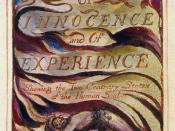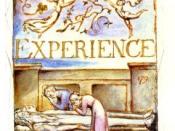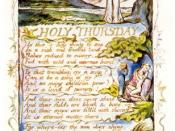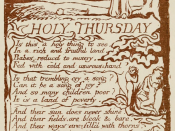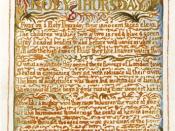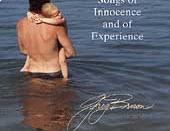Holy ThursdayHoly Thursday shows it self in both the "Songs of Innocence" and the "Songs of Experience". This poem by Blake depicts the scene of poor children going to church to sing. Though they show the same scene they have two different sides of the story.
Holy Thursday from the Songs of Innocence shows poor children "walking two and two, red and blue and green;"(line2) this can show that the children though poor are not uncivilized. The children in this line have a structure of two and are not just running rampant and seam to be happy. The Songs of Experience seam to contrast the feelings of poor children being happy. "In a rich and fruitful land, babes reduced to misery."(s.o.e.L2-3) This shows the children in red, blue and green as miserable when they don't have to be.
The speaker of Holy Thursday in the Songs of Experience seams to blame the "Grey headed beadlesâ¦"(S.o.
I.L3), described as giving order to the children in the Songs of Innocence, as the reason behind their misery. The Songs of Experience talk of them as not giving order but as feeding them "â¦with cold and unsurous hand?"(s.o.e.L4). This is not talking of feeding them but adding to there hunger and misery.
The next part of contrast between the town poems is the songs the children are singing. The songs were supposed to be that of joy and thanks to God for what he has given us. The poem from the Songs of Innocence agrees with this by saying "Now like a mighty wind they raise to heaven the voice of song, Or like harmonious thunderings the seas of heaven among."(s.o.i.L9-10) The children seam happy and content with what God has given them and are willing to thank him joyfully, but the poem from the Songs of Experience thing other wise. "Is that trembling cry a song? Can it be a song of joy?"(s.o.e.L5-6) The speaker in the poem seams to think that the children are to week and unhappy to sing a song of joy thanking God. The speaker even goes as far to talk about their lives in heaven.
"And their sun does never shine, And their fields are bleak and bare, And their ways are fill'd with thorns; It is eternal winter there."(s.o.e.L9-12) The Holy Thursday from the Songs of Experience hates the fact that the children are poor. The speaker says "Nor poverty the mind appall."(s.o.e.L16) Which means that the children should not live in suffering but should never have to think of poverty. Holy Thursday from the Songs of Innocence takes a different approach the to poverty that the children face. "Then cherish pity, lest you drive an angel from your door"(s.o.i.L12) that line is directly in reference to Hebrews 13.2: "Be not forgetful to entertain strangers: for thereby some have entertained angels unawares." Which means though the babes are poor they are still children of God, and will be rewarded the greatest reward of all.
Though the poem Holy Thursday from the Songs of Experience is in direct conflict from the Holy Thursday from the Songs of Innocence, something can be taken from them both. The Songs of Innocence are to naïve in thinking that the poor boys and girls are completely happy with being poor and would not want anything else. Also The Songs of Experience is on the extreme by saying the children never have a moment of happiness in their lives. What one must do is take both poems and combine their thoughts of Holy Thursday together and you will receive what the true lives of the children were on a Holy Thursday, Sad about being poor but happy to be alive and thanking God for it.
